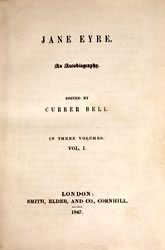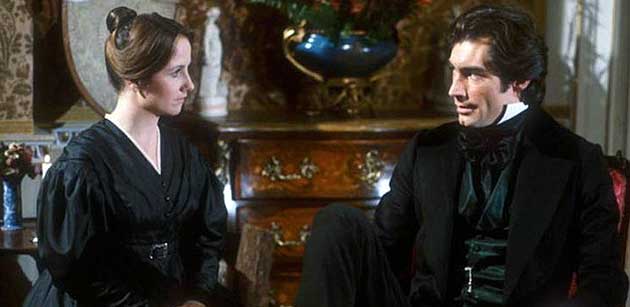Jane Eyre
Critique • Quotes • Text • At the movies
 First edition title page
First edition title pageFirst publication
1847
Literature form
Novel
Genres
Literary, Gothic romance, social criticism
Writing language
English
Author's country
England
Length
Approx. 186,000 words

Zelah Clarke and Timothy Dalton are an effective mismatched Eyre and Rochester in 1983.
Inexplicable, undeniable love
Jane Eyre (1983): Television series, 239 minutes; directed by Julian Aymes; writer Alexander Baron; featuring Zelah Clarke, Timothy Dalton, Jean Harvey, Alan Cox
Forty years after the first major Hollywood film of Jane Eyre comes the definitive adaptation, though it's not my favourite version.
This television serial, spread over four hours and first presented by BBC in eleven episodes, has been the favourite of enough other viewers to make Timothy Dalton a romantic star as Mr. Rochester—much as Pride and Prejudice would for Colin Firth more than a decade later as Mr. Darcy.
But unlike the Jane Austen series, the adaptation of Charlotte Brontë's novel sticks very closely to the author's story. That is, it doesn't sex it up or otherwise introduce modern sensibilities. In fact, few other adaptations of classic works have been as faithful to the original text as this Jane Eyre is. To the delight of loyal Jane Eyre readers, numerous lines of dialogue are taken directly from the book.
The plot is also very close. Sure, there is—there has to be—some trimming in the adaptation of a substantial novel into a movie, even into a relatively lengthy series. But so many scenes were included that I hadn't remembered being in the book, that I had to repeatedly go back to the book to confirm they were indeed Brontë-penned.
Unlike a lot of productions, this one moves deliberately through Jane's early life as an orphan and mistreated student rather than rushing ahead to her meeting with Mr. Rochester.
Television promo for the Jane Eyre serial of 1983.
The downside of this faithfulness to the text is that the story moves a little slowly for television. From today's perspective, the production suffers from stodginess.
Despite the focus on Jane from the beginning through to the end, viewers cannot really warm to her as played by the actress in this series. Zelah Clarke performs well and it could be argued she portrays Jane exactly as created by the novelist, as sort of a bland, thoughtful, unformed and not particularly attractive young woman. (Very young. We sometimes forget she is not even out of her teens for almost the entire story.)
But Jane is also supposed to be someone with an intelligence and a private charisma that blazes forth unexpectedly. We don't really see this illumination. We don't really know what draws Misters Rochester and Rivers to her or what wins the fondness of various female companions. We're told she has a special quality but we never see it.
Next to Dalton's Rochester who does light up the screen—though not with goodness—Clarke seems ordinary.
The series goes out of its way, especially near the end, to make Brontë's point that love cannot be explained. And even though we don't know why our two leads fall for each other, their union at the end is as moving as in any adaptation.
— Eric

